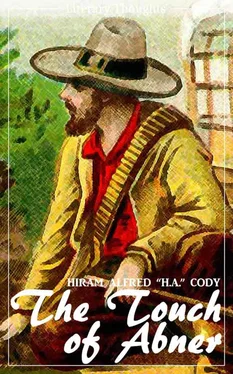The Touch of Abner by Hiram Alfred „H.A.“ Cody
Literary Thoughts Edition presents
The Touch of Abner,
by Hiram Alfred „H.A.“ Cody
Transscribed and Published by Jacson Keating (editor)
For more titles of the Literary Thoughts edition, visit our website: www.literarythoughts.com
All rights reserved. No part of this edition may be reproduced, stored in retrieval system, copied in any form or by any means, electronic, mechanical, photocopying, recording or otherwise transmitted without written permission from the publisher. You must not circulate this book in any format. For permission to reproduce any one part of this edition, contact us on our website: www.literarythoughts.com.
This edition is licensed for your personal enjoyment only. It may not be resold or given away to other people. If you would like to share this book with another person, please purchase an additional copy for each recipient. If you’re reading this book and did not purchase it, or it was not purchased for your use only, then please return to Amazon and purchase your own copy of the ISBN edition available below. Thank you for respecting the efforts of this edition.
CHAPTER I – BRAINS, GALL, AN' LUCK
"Put me down fer a thousand."
These words drawled slowly forth produced an immediate effect, and caused fifty people to straighten suddenly up and look enquiringly around. The reporter of The Live Wire gave one lightning glance toward the speaker, and then began to write rapidly upon his pad lying before him. The chairman, too, was visibly affected. He leaned forward, and searched the room with his small squinting eyes.
"Did I hear aright?" he asked. "Did someone say 'a thousand?'"
At once a man in the back row started to rise, but was pulled quickly down by a woman sitting at his side.
"Let go my coat-tails, Tildy," he whispered.
"But, Abner, are you crazy?"
"Crazy, be hanged! Leave me alone, can't ye?"
"Oh, it's you, Mr. Andrews, is it?" the chairman remarked.
"Yes, it's me all right."
"And you wish to give one thousand dollars?"
"That's what I said."
"Well, then, will you please step forward and sign your name?"
"Oh, that feller waggin' the pen kin do it better'n me. Jist tell him to put Abner Andrews, of Ash Pint, down fer a thousand."
"But we would prefer to have your own signature," the chairman insisted. "It is always customary in cases such as this."
"Are ye afraid that I'll back out, an' won't pay?"
"No, not at all, Mr. Andrews. But, you see, it's more business-like to get your name in your own handwriting. We shall make an exception, though, in your case if you so earnestly desire it."
"Now ye're shoutin'."
"Doing what?"
"Shoutin'; talkin' sense. Don't ye git me?"
"H'm, I see," and the chairman leaned his elbow upon the table and gently stroked his chin with the fingers of his right hand. "I didn't understand you at first, as I am not accustomed to such expressions."
"But ye understand the meanin' of a thousand dollars, don't ye?"
"Indeed, I do, Mr. Andrews, and what is more, I wish to thank you very heartily. I am sure that all here to-night feel most grateful to you for your generosity."
"Oh, I don't want ye'r gratitude, an' as fer as I kin see, it's worth darn little."
"Abner! Abner!" the voice at his side chided. "What are you saying?"
"Didn't ye hear, Tildy? Where's ye'r ears?" and Abner turned slightly toward his protesting wife. "I was merely remarkin' that the gratitude of this gatherin' of men an' women is worth darn little. Now, d'ye hear?"
"How do you make that out, Mr. Andrews?" the chairman sharply questioned. "Such a statement demands an explanation."
"Hear! Hear!" came from several.
"How do I make that out?" Abner repeated, as he scratched the back of his head, and let his eyes roam for a few seconds around the room. "Well, I'm jist judgin' accordin' to what I have seen an' heard. Me an' Tildy came to town to-day to do a little shoppin', an' happenin' to hear that there was to be a meetin' of the influential people of this place to see about the buildin' of a Home fer orphan children, we made up our minds to come too. We're mightily interested in orphans, we surely are. I've often told Tildy that it's a downright shame that this town hasn't sich a Home, where poor little orphan kids kin be well looked after."
"You're quite right, Mr. Andrews," the chairman assented. "We have delayed this matter too long already. But now that you have given us such splendid assistance, the work should go rapidly forward. I am very glad that you and your wife came to this meeting."
"Yes, me an' Tildy came here," Abner continued, "expectin' to see somethin' real grand. We've heard a great deal of highfalutin' talk about poor little orphans an' what ought to be done fer 'em. But, skiddy-me-shins, as fer as I kin see it'll all end in wind, an' nuthin''ll be done."
"I object to such remarks," a pompous little man protested, rising suddenly to his feet, and appealing to the chairman. "We didn't come here to listen to such language and abuse from this ignorant countryman."
"You jist flop down an' hold ye'r tongue, Ikey Dimock," Abner ordered. "I've got the floor at present, an' I intend to keep it, too, until I've had my say. You made a big harangue a little while ago, an' how much was it worth? Ten dollars, that's all. An' you one of the richest men in town. An' that's the way with the rest of yez. Ye've talked, but when it came to givin' yez wer'n't there. That's the reason why I said ye'r gratitude is worth darn little. I don't want ye'r gratitude, anyway. It's them poor little orphan kids I'm worried about, an' I guess I'll worry a long time before any Home is built, judgin' by this meetin'. Come, Tildy, let's go home. I've had enough of this."
A complete silence reigned in the room as Abner and his wife walked slowly to the door. When they were at last out of the building, the chairman breathed a sigh of relief, and a slight smile flickered across his face.
"Now that the cyclone is over," he remarked, "we will gather up the fragments that remain and go on with our building."
A ripple of amusement passed through the assembly, and there were numerous whispered conversations. Instead of being very indignant at what Abner had said, all, except Isaac Dimock, were inclined to treat the countryman's cutting words as a joke. They wondered, nevertheless, at the offer he had made of one thousand dollars. The reporter kept steadily on with his writing. He was alive to the situation, and chuckled to himself as he thought of the stirring article he would have for The Live Wire in the morning.
Abner untied his horse from the post near the place of meeting, while his wife scrambled up into the carriage. Neither had spoken a word since leaving the building. It was only when well started on their homeward way that Mrs. Andrews ventured to speak.
"What was the matter with you to-night, Abner?" she enquired.
"Nuthin', as fer as I know."
"Yes, there was, or you wouldn't have spoken and acted the way you did."
"Oh, I jist wanted to give them folks a jolt, that's all."
"And made a fool of yourself, didn't you?"
"De ye think I did, Tildy? Gid-dap, Jerry."
"I know it. Only a fool or a lunatic would offer to give one thousand dollars when he hasn't a cent to his name."
"Ye'r wrong, Tildy. I'm not crazy, an' I don't think I'm altogether a fool. It was somethin' else that shook me timbers at the meetin'."
"What was it?"
"Oh, you know as well as I do. I imagined I was as rich as I used to be several hundred years ago, an'——"
"For pity sakes, Abner, stop that nonsense. Because you think you lived hundreds of years ago, and that you were very rich and a great man, doesn't make you rich and great now. You're only Abner Andrews of Ash Point, and can hardly pay your bills, let alone give one thousand dollars toward building a Home for orphan children."
Читать дальше












